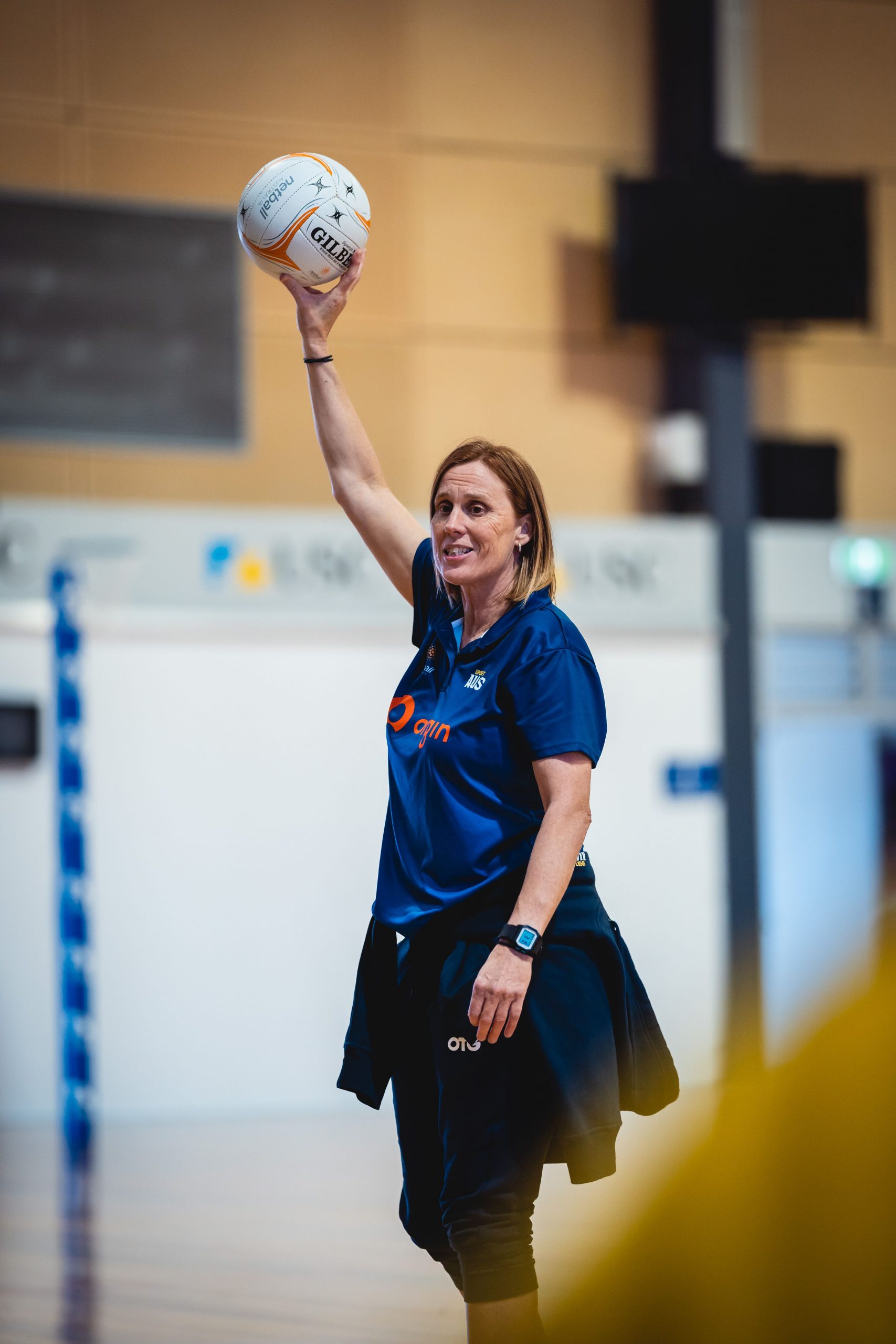
Nic Richardson is an Olympic bronze medallist, played 32 Tests for the Australian Diamonds and also holds the unique honour of being the last Australian player to debut in the 20th century.
Over the last decade, she’s made her way through the elite coaching ranks, gaining valuable exposure in both Victoria and Western Australia, and having just completed her first year as head coach of the Collingwood Magpies in Australia’s Super Netball league.
Returning to the green and gold, this time as the new Diamonds assistant coach to Stacey Marinkovich, Richardson is ready to hit the ground running, with limited time before the 2022 Birmingham Commonwealth Games.
Jenny Sinclair spoke with her ahead of Australia’s departure to London for the Quad Series.
It feels like with Covid, the role of the national coach sits somewhere between tough and impossible these days, so what appealed to you about taking on the assistant coach role?
The opportunity to be involved, back in the green and gold again, having experienced that as a player for one. I’ve worked before with Stacey Marinkovich at West Coast Fever, we get along well and have a good working relationship, and coach well together on the bench.
Richardson has a great relationship with her athletes at Magpies. Image: Marcela Massey
We’ve seen the impact that you’ve had at Fever defensively, and now at the Magpies, what are the strengths you bring to the national role?
I think having played the game at the elite level and understanding the emotions that athletes go through. Through my club history, I’ve come from a winning culture and trying to get that across to the Magpies environment now – and I think we made really good inroads this year, we only missed out on finals by a game, and we were really competitive in the majority of matches. So hopefully what I can do is bring a never-say-die, winning attitude across into this Diamonds environment.
Since coming into the team, what’s your focus been?
Working in conjunction with Stacey in terms of what she’s looking for from a defensive perspective, but also trying to develop additional defensive strategies. Obviously the ‘Australian Way’ is that dogged one-on-one defence, which is always our default, but what else can we bring to our defensive game to try and unsettle opposition attack ends?
You’re known as a coach for changing defensive structures, moving to an off-line defence, for example, how do you decide when that’s used on court?
Now it’s about the accountability of the playing group, getting them to have a really good understanding of what’s working and what’s not working. Depending on where they feel they’re getting beaten, they can go to their tool kit and bring out another strategy. So it’s making sure we educate the athletes on what strategy is going to work best in each circumstance.
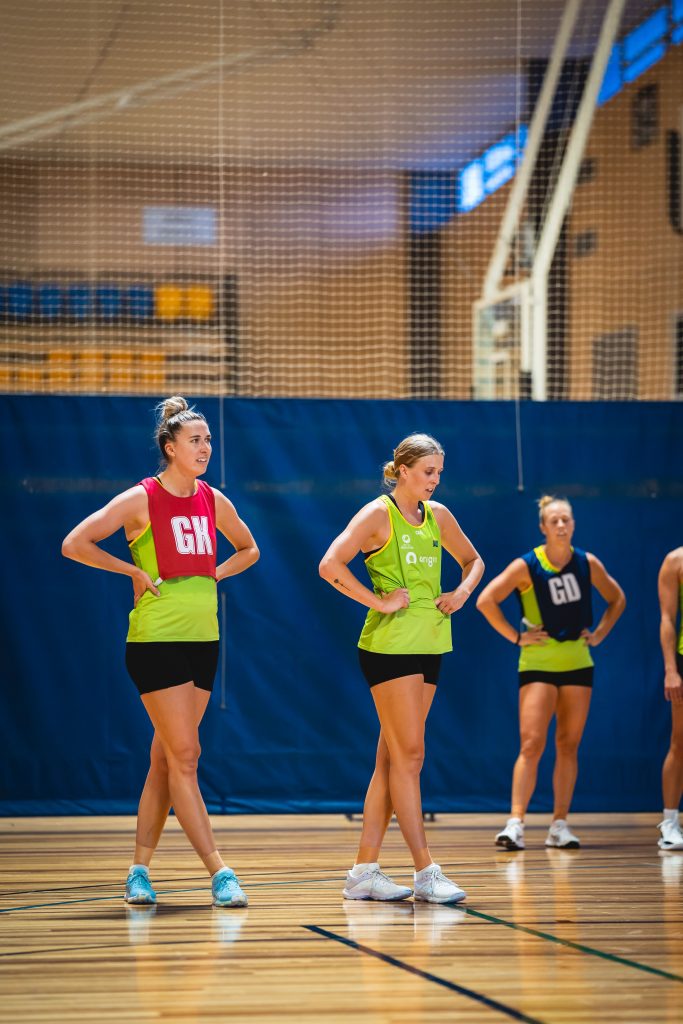
Will existing defensive combinations help during the Quad Series? Image supplied by Netball Australia
In the defensive end of the Quad Series team, there’s two existing Super Netball combinations. With limited preparation time before the Commonwealth Games, does it make a difference having those existing combinations in place?
It does, because of the options and depth it provides. There are players there – Courtney (Bruce) and Jo (Weston) – who have played together internationally, so there’s that understanding as well. Then there’s the (NSW) Swifts defensive combo in (Sarah) Klau and (Maddy) Turner and then the Fever combo with Courtney and Sunday (Aryang). It’s a pretty exciting defensive end, with athletes who like to fly at the ball, and I’m probably one of those coaches that gives the players a bit of a leash to be able to fly.
Defenders need to have some courage under fire at Super Netball level and at national level too. It’s really hard to turn ball over, particularly if you’re waiting to do so at the circle edge, so we need to be creative and find ways to win ball earlier. So that’s something I’m looking forward to seeing — how creative our line up can be to force turnover.
There’s far more emphasis these days on midcourt defence, particularly playing against teams with tall goal shooters. What are the keys to it being successful?
It’s about intent. Willing yourself to the next contest. And there’s absolutely no downtime. We talk a lot about dead-ball time. So what can you do defensively to get under the nose and under the skin of your opponent? And making sure you’re switched on the entire time, because there’s no time to relax at all, otherwise your opponent can have that step on you. For the Diamonds, it’s all about intent and getting to the next contest.
Stacey Marinkovich recently stated that due to the team size in Super Netball being ten as opposed to 12 for internationals, it’s lead to greater player versatility. Where do you sit on this, in terms of having positional specialists?
When you’re looking at the Diamonds, you’ve got the capacity to take specialist-position athletes. If you are having a specialist in your team, they have to be your best in that position, in order to be able to carry them. With the ten at Super Netball, it’s really important that you do have that versatility of player that can play across – looking at the midcourt – two, if not all three positions. And then probably your defenders, if they can come out to wing defence as well. At the Diamonds, if required, we do have Jo Weston, Maddy Turner or even Sunday to put out to wing defence as well. Having that versatility provides more depth and options to your line up.
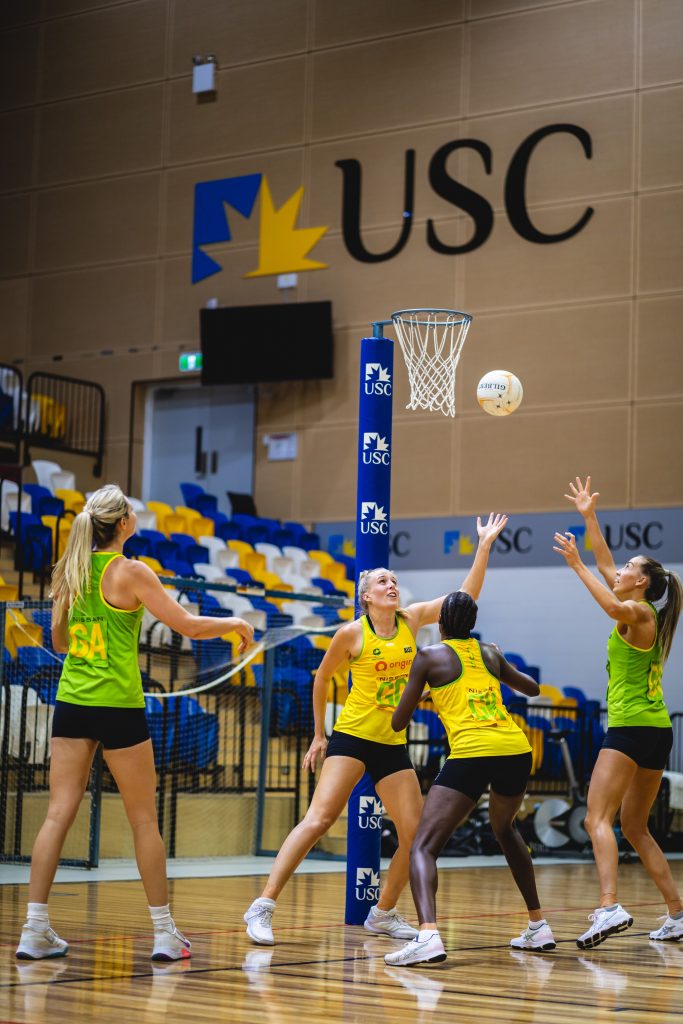
The Diamonds have versatility in the defence end with a number of athletes able to play all three positions. Image supplied by Netball Australia
It’s been spoken about how time outs in Super Netball may be having an impact on the international game, so how has that been negotiated over the last few months within the Diamonds camp?
We’ve had limited time – a camp on the Sunny Coast before the England series was cancelled, so we spent a bit of time then and we’ve only had a day here (in Sydney), but the athletes have come here in really good shape, so I don’t think the time outs are going to have an impact too much. They’re all fit and firing and ready to go. The good thing about this is that they’re actually coming off a fair break, so it’s not as if they’ve just finished Super Netball and then having to line up for international duties straight away.
On the back of the disruptions Covid has delivered, severely reducing the number of tests the Diamonds have been able to play, is there a sense of any extra emotion from the group that this Quad Series is not taken for granted?
Yeah, I have. The girls are excited for the opportunity to showcase their skills in the world arena. I had the opportunity to present Cara Koenan and Sophie Garbin with their Australian Diamonds number and pendant in Sydney. With my take on it, I just said to the girls, I played 30-odd matches for Australia and not once did I take my time in the team for granted.
But I would hope that every time they pull on the dress, it never gets old and that they’re as excited to pull on the dress as what they were the first time. There’s the added excitement that they haven’t played in a while, to represent their country, and that’s a massive goal for the majority of young netballers.
As a former Diamond, what are the most significant changes that you’ve seen in the Australian team now that you’re coming back in as a coach?
For me, the changes are just not only at international level, but it’s also, I played at the (Melbourne) Kestrels in the Commonwealth Bank Trophy and even at that level it’s just now that the demands on athletes off court have just increased incredibly. Whether they’ve got their personal sponsors or team sponsors, the media commitments, so I think that aspect of the game has really come along a fair way. There’s probably the speed of the game has probably got a little bit quicker as well.
In the Australian environment, as soon as I walked in, I felt like I was really welcomed and that I belonged, and I think that’s important for anyone new to an environment. There’s no hierarchy within the players anymore, they’re all on a level playing field and the leaders of the team are so humble as well, so it makes for an inviting environment.
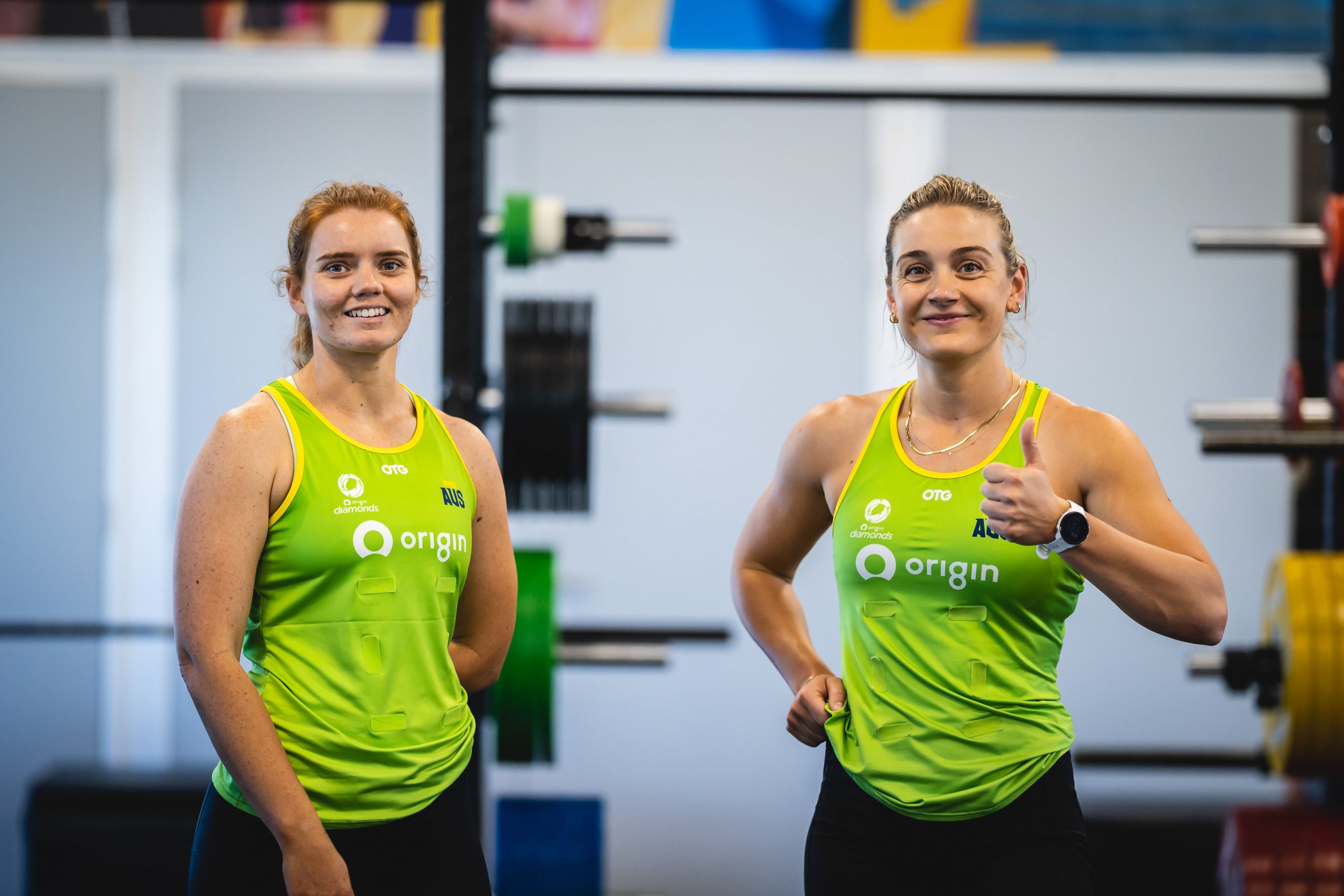
The new look Diamonds leadership duo in Liz Watson (c) and Steph Wood (vc). Image supplied by Netball Australia
Tell us about the working relationship between yourself and Stacey Marinkovich?
It’s hard to put into words. We just bounce off each other really well. Stacey is really open to feedback and I guess we’re coaches who empower not only our athletes, but each other and the staff around us. The saying is “two heads are better than one”, isn’t it? We’re similar in that we’re coaches, not about being dictators and I think that’s where it works so well. It’s an environment where I feel like I can voice my opinion and that’s taken on board and whether it’s a change, or “let’s keep it this way”, we’ve still got the capacity to be able to challenge. As an assistant coach you’ve got to be comfortable in challenging the head coach, and then you have to be really supportive, because at the end of the day the buck stops with Stacey. But we gel well together.
We had that experience over at West Coast Fever for two years. We haven’t coached on the bench for a little while together, so we’re looking forward to seeing what that looks like. We’re both pretty easy going characters, so I think that makes life a lot easier as well.
Do you think there’s been a psychological impact about the reduced amount of matches the Diamonds have had compared to some other teams in the lead up to the Commonwealth Games, and the fact they don’t have a major trophy in cabinet at the moment?
I don’t think so. The 15 athletes that we’ve got at the moment have got the intention of remaining the number one netball nation in the world and I think the fact we don’t hold a major trophy at the moment is inspiring them and giving them the fire in the belly to grab those trophies back. It’s been an incentive for this group.
Where do you think the Diamonds key strengths are at the moment?
It’s a real dynamic group at the moment, which is exciting. We can move between strategies and a few different game styles based on the players who are out on court. I think we’re a team that’s moved away from being too one-dimensional. There’s a lot of creative flair on court, and you’ve got a couple of players who are really good leaders on court and students of the game. And you don’t find that a lot. And then you’ve got those that play on instinct, so it’s a real mix.
It must make a significant difference to the shooting end to have Gretel Bueta and Steph Wood in the side, after they sat out the Constellation Cup last March?
It’s a real dilemma in the shooting end! There’s an excitement for the different combinations that can be run. Having Steph and Gretel back in the line up just adds to that – they’re both creative and play with flair, so then it becomes the unknown for the defensive end in terms of what’s going to happen out there. Having them back just adds so much depth and versatility to that goaling end.
Sophie Dwyer must have been impressive at camp to make the step up into the touring side?
Sophie had a really good Super Netball season and was an exciting junior coming through the ranks. She’s really impressed, not only there, but in the training camp environment and has deserved the call up. The likes of Dwyer and Sophie Garbin, and also Sunday, I think it’s their first trip to the UK, but we’re really bound to the netball courts and hotel, the poor buggars!
There’s considerable height and flexibility in the defensive end. That must be a joy to work with.
A massive joy. I love it (laughs). And what I love about them is that the styles of defence that we play, we’ve got people that want to win ball. When you’ve got player who are ok to take a risk, and you have to be defensively courageous to take those risks, you’ve got a group who is developing a lot of trust at that end. That connection and trust they build allows whoever is playing goal keeper to fly at long balls, knowing that they’re going to be backed up. And then you’ve got a midcourt with (Kate) Moloney and (Ash) Braz who can win a lot of ball themselves. So I’m looking forward to seeing what they do individually and as a unit as well.
Speaking of the midcourt, it must have been the toughest group to pick. What impressed you about the five that you’re taking?
You’re spot on, that was the hardest. I’m not a selector and I’m glad I’m not! But I’m sure it would’ve given them (selectors) their biggest headache. You’ve got some good balance of size and strength, and a speed balance as well. It’s the same across both ends as well. You’ve just got that dynamic, the variety in what they can bring to the game and that’s really important. When you’re looking across (the bench), you don’t want same-same. So there’s a good mix and good spread of power through the midcourt.
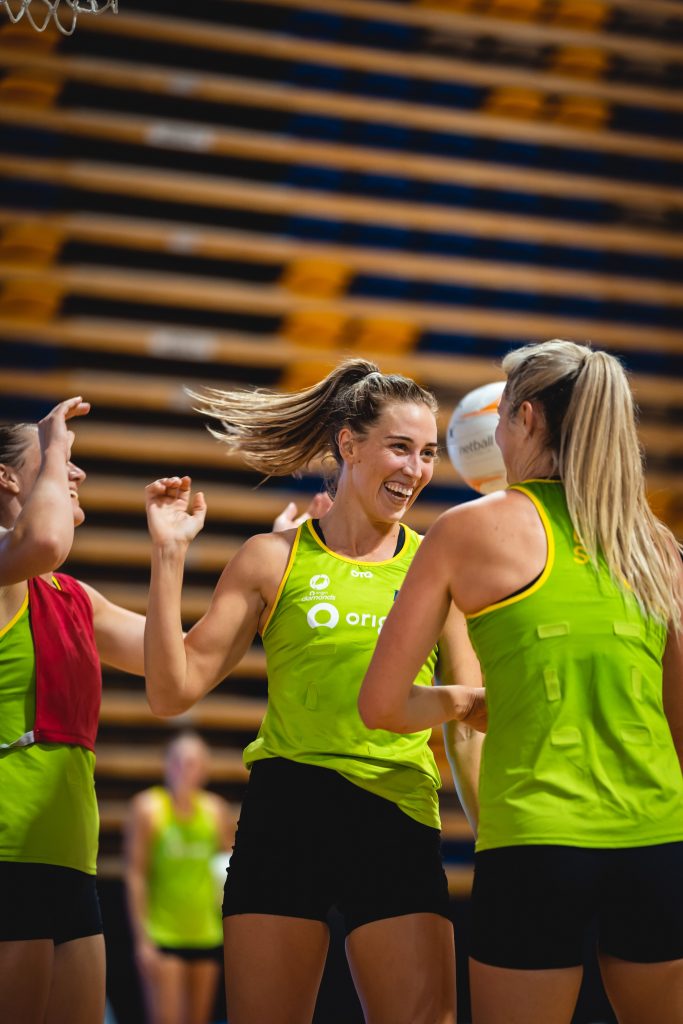
The team is in good spirits heading into the Quad Series. Image supplied by Netball Australia
You’ve all effectively been in lockdown since Christmas. How tough has that been to deal with?
It’s been tough, but given the position that we’re in, we’re very privileged to continue to play the game that we love. From my perspective, it’s a small sacrifice to make in order to do what you love doing. It’s probably been tougher on those that you live with, because they’ve been under the same type of restrictions. But if we want to be able to compete and play at this elite level and travel internationally, I think it’s a small sacrifice to make.
We’ve got great support staff, there’s been regular catch ups and check ins and the girls do daily medical check ins as well, and obviously the mental part of it is just as important as the physical side of things. Our staff are first class in what they do and bring to this group.
In order to develop that winning culture and one of belonging and family, which the girls are really big on, it’s all about the people and we have great people. That’s probably why it’s easy to put your hand up and decide that you want to have an opportunity to be involved, because of the people.
Nicole Richardson coaching history
Australian Diamonds assistant coach 2021-current
Collingwood Magpies head coach 2021-current
Collingwood Magpies assistant coach 2019-20
City West Falcons (Victorian Netball League) 2009-2019 (14 titles, inc. five Championship Division)
West Coast Fever assistant coach 2017-18
Achieved High Performance Coaching Accreditation 2016
Victorian 21&Under head coach 2015 (Runners Up)
Victorian 19&Under head coach 2014 (Runners Up)
Victorian Fury assistant coach 2013 (Champions)
Victorian 17&Under head coach 2013 (Champions)
Victorian 17&Under assistant coach 2012 (Runners Up)
Richardson’s coaching style isn’t one for sitting on the bench too much.
